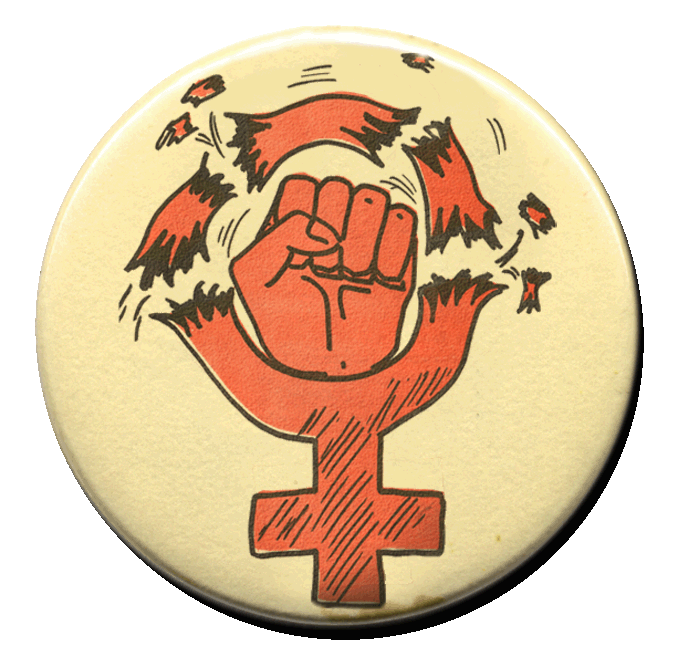The fight for the ‘Fristenlösung’ is won – and lost once again. The West German women’s movement celebrates its first festivals. The initially benevolent tone of the (men’s) media is exacerbated.
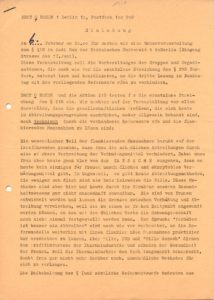
January 14, 1974
The ARD sends the TV movie Und wir nehmen uns unser Recht! Lesbierinnen in Deutschland by Claus F. Siegfried. The women’s group of the Homosexuellen Aktion Westberlin (HAW) is decisively involved in the conception. The differentiated film meets with positive response. More lesbian groups are founded.
January 17, 1974
In Heidelberg, a group of women occupy a vacant house to build a women’s center there. Six days later, the house is cleared by the police and the squatters are tried in court. This corresponds to the general tendency of the now harder action of the state against squatting.
February 6, 1974
In Berlin, the women’s group Brot und Rosen initiates a ‚Teach-In‘ about § 218. More than 2,000 participants come to the Technical University to listen to lectures and to exchange views on the following topics: § 218, contraception and the power of physicians. – The third reading of the §218 reform in the Bundestag is announced for June. The women’s movement mobilizes all forces.
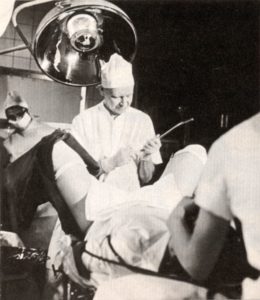
On the initiative of a small Berlin women’s initiative, all well-known feminist groups in West Germany and West Berlin are mobilized to take to the streets on 7 March. Their intention is to force the hesitant SPD / FDP majority to pass the ‘Fristenlösung’ with this ‘Aktion Letzter Versuch’ [Last Attempt Campaign].
Women’s groups from all over Germany follow the call and organize a whole „week of action“ from 8 to 16 March 1974 for the reform of § 218. (Dossier with all original documents of the campaign in the FMT)
March 9, 1974
Encouraged by activists of the ‘Aktion Letzter Versuch’, 14 doctors in Berlin publicly announce and carry out an abortion with the so-called Karman method – the gentle suction method that is not yet used in Germany. The physicians are thus demonstratively on the side of help-seeking women and against their colleagues who refuse abortions in the name of their personal ethical conviction.
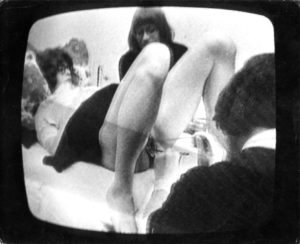
At a press conference, they explain: „Every day 2,000 to 3,000 illegal abortions are carried out in the Federal Republic. Our campaign should put an end to the hypocrisy. We demand equal rights for all, the development of innocuous methods of contraception and child-friendly living conditions. “
The journalist and feminist Alice Schwarzer, one of the initiators of the ‘Aktion Letzter Versuch’, is simultaneously filming a report for the TV magazine Panorama on the doctors‘ protest and abortion.
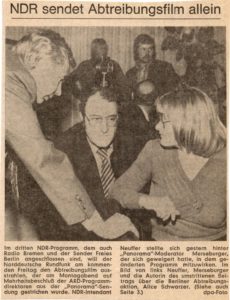
March 11, 1974
Almost three years after the self-incrimination of women in the Stern 329 Doctors confess in the magazine Spiegel: „We have helped women getting abortions without financial benefit and will continue to do so.“ This confession is also part of the ‘Aktion Letzter Versuch”‘, about which the Spiegel reports in its Cover Story Aufstand der Schwestern [Uprising of the Sisters].
The Federal Republic is experiencing its biggest TV scandal ever: The Panorama report is canceled one hour before broadcasting time. The decision of the ARD directors is based on a protest telegram sent by the chairman of the German Bishops‘ Conference, Cardinal Döpfner, on the same day. The cardinal had also filed criminal charges against the „violent crime“. As a means of protest against the cancellation of the report, all Panorama authors withdraw their contributions. Panorama boss Peter Merseburger broadcasts from an empty studio for 45 minutes.
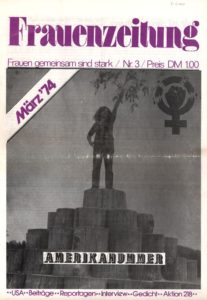
The scandal is perfect. Media and people debate for weeks on the § 218. With the effect desired by the feminists: Only two months later, the SPD / FDP majority in the Bundestag adopt a new law for the ‘Fristenlösung’. But only another eight months later, the law will be overturned by the Federal Constitutional Court.
March 16, 1974
On the „National Day of Protest“ thousands of women in many German cities mobilize against the § 218 with demonstrations, street theatre and withdrawals from church membership. In Frankfurt alone, 350 women leave the Catholic Church collectively.
End of March 1974
The third issue of the Frauenzeitung appears. The main topic is rape. After the US-American feminists have analyzed the function of sexual violence in their texts, the subject of sexual violence now also finds its way into the German feminist debate.
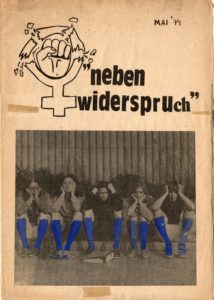
Also in 1974 appears Frauen – das verrückte Geschlecht? by Phyllis Chesler (original title: Women and Madness, 1972). The author describes depression, insanity and addiction of women as an outbreak and rebellion against women’s traditional roles. Chesler’s book is an important impetus for committed psychologists, psychiatrists and analysts.
April 23, 1974
The first women’s seminar starts at the Free University of Berlin. It was initiated by the university group of the Women’s Center. Title: ‚On the Situation of Female Students and Lecturers in Germany and West Berlin‘. As a result of the women’s seminar, the first women’s university newspaper is published under the title: ‘Nebenwiderspruch’. The provocative title is explained by the fact that in the left-wing discourse the gender issue in capitalism has always been described as a negligible ’secondary contradiction‘ – in contrast to the ‚main contradiction‘ between classes. The newspaper, which appears until 1978, documents women’s initiatives in higher education.
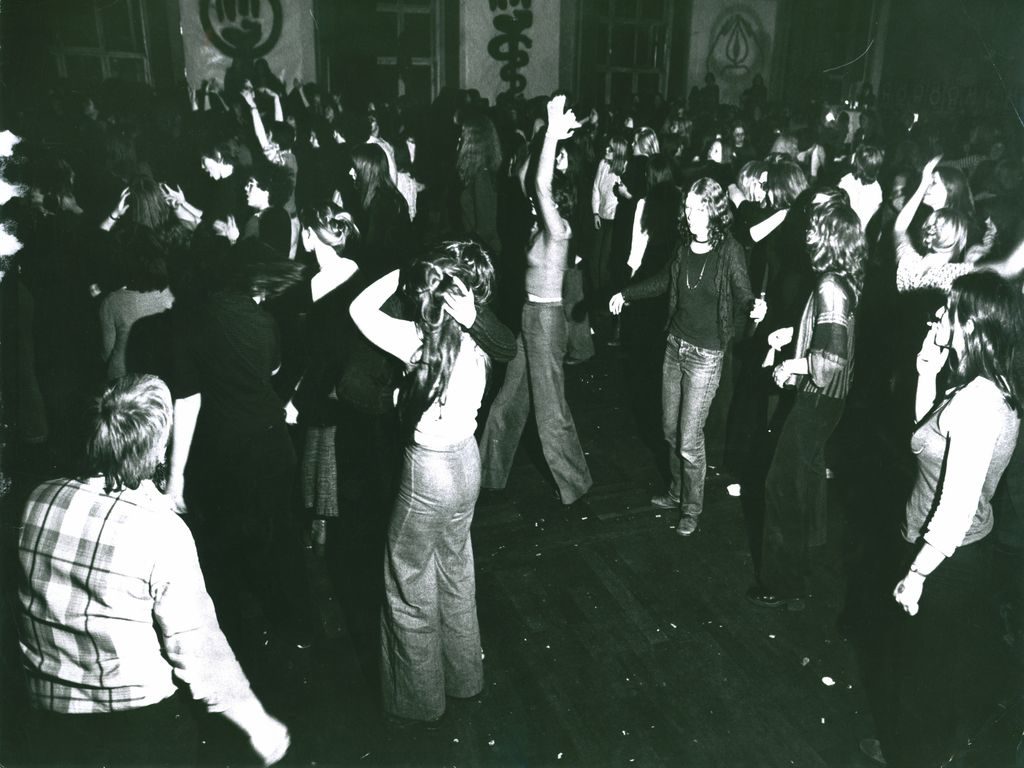
3th-5th May 1974
At the Women’s Congress in Heidelberg, women’s groups discuss various women’s center concepts. The first initiative for a feminist women’s publisher introduces itself.
May 11, 1974
A small group within the Berlin Women’s Center initiates the first public women’s party in the TU Berlin: the Rockfete im Rock. At first some members of the women’s center are afraid that the „women at the base“ would have no understanding for a pure women’s festival. But the festival initiative prevails and turns the Rockfete im Rock into an event and a political statement.
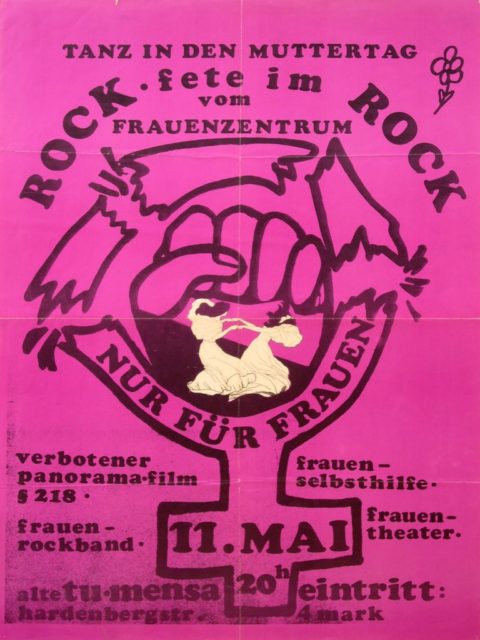
Their leaflet states: „We all agree that we want to stay among us women at this first public women’s festival. We know from former experiences, that we behave more freely if men are not present. Therefore, women, come alone that evening. “
Over 2,000 women take part. The censored Panorama report is shown at the festival. Women from the health support groups demonstrate self-examination. Ina Deter appears and sings the song “Ich habe abgetrieben” [I had an abortion]. On the occasion of the festival, some Berlin women form the first German women’s band. One year later, they become the Flying Lesbians.
Pentecost 1974
In Berlin, the 1st International Lesbian Pentecost Meeting takes place. Motto: „Feminism Theory – Lesbianism the Practice?“ Almost 200 women take part.
![Internationales Lesbentreffen Pfingsten 1972, 1973, 1974, 1975. Lesbisches Aktionszentrum (LAZ)[Hrsg.]. Berlin: Selbstverlag, 1975. (FMT-Signatur: LE.11.023) Internationales Lesbentreffen Pfingsten 1972, 1973, 1974, 1975. Lesbisches Aktionszentrum (LAZ)[Hrsg.]. Berlin: Selbstverlag, 1975. (FMT-Signatur: LE.11.023)](http://frauenmediaturm.de/wp-content/uploads/2018/04/74_2a_Lesbentreffen-209x300.jpg)
June 5, 1974
The Bundestag passes the Fristenlösung with a with a narrow majority. Abortion should now be allowed within the first three months. But the CDU / CSU opposition files a constitutional complaint. The court suspends the law by a temporary injunction – until the decision of the Federal Constitutional Court.
21th-23th June, 1974
In the Evangelische Akademie Loccum, the first joint meeting of autonomous feminists and representatives of traditional women’s associations (Entrepreneurs Association, Association of Working Women, Federal Association of Single Mothers, etc.) takes place on the subject of the ‚Emancipation of Women‘.
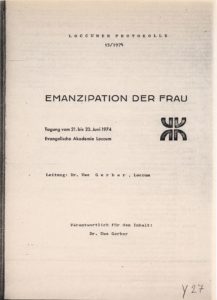
The highly acclaimed seminar is the nucleus of cooperation between the women’s movement and traditional women’s organizations, initially still behind closed doors.
Inge Sollwedel: Cooperation becomes visible (conference report)
July 1974
Brigitte publishes a comprehensive study by sociologist Prof. Helge Pross on „Housewives in Germany“. Result: „Housewives are satisfied with their lives, they say. But is that really true? Many of the results of the study raise doubts.“ The results of the study will be discussed at a high-level conference in Hamburg. Among the 300 invited guests are Federal Family Minister Katharina Focke and Alice Schwarzer, representatives of professional associations and the „Club of Young Housewives“.
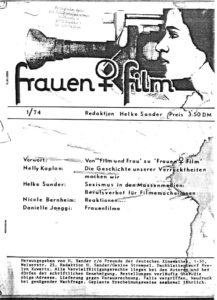
A controversy around the question of the housewife’s wage divides the women’s movement. The book “Die Macht der Frauen und der Umsturz der Gesellschaft “ [The Power of Women and the overthrow of the society] by Selma James and Maria Rosa dalla Costa raises the question of the ‚wage for housework‘. James and dalla Costa – demand an upgrading of housework by paying homemakers – the others want the abolition of housework as a work of women and demand shifting responsibilities of women, men and society alike.
The latter was already a demand by activists of the Historical Women’s Movement, such as Louise Dittmar in her 1849 essay ‚Wider das verkochte und verbügelte Leben der Frauen’.
Summer 1974
The first feminist film magazine Frauen und Film is published by Helke Sander. – The first LP from the women’s movement is published under the title Von heute an gibt’s mein Programm. The record is published by women’s groups from Munich, Frankfurt and Darmstadt. After the 3rd edition, the record is no longer available.
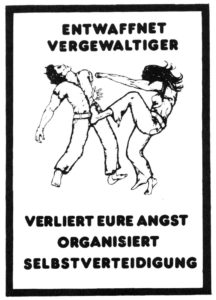
September 1974
The first women’s group Women against violence against women is founded in the Berlin Women’s Center. The activists publish texts on the subject, observe rape trials and plan a counseling center for rape victims on the model of the American Rape Crisis Center. – The activists of the Historical Women’s Movement have also been watching trials against rapists and organized protests against scandalous acquittals. (Anita Augspurg: Wieder ein Schlag ins Antlitz der Frau, 1905)
September 2, 1974
The Spiegel headlines: Frauen lieben Frauen – Die neue Zärtlichkeit. The magazine thus reacts to the increasing self-confidence of homosexual women as part of the women’s movement. The Spiegel notes: „According to Kinsey, one in four women is aware that she has once reacted with sexual arousal to another woman.“
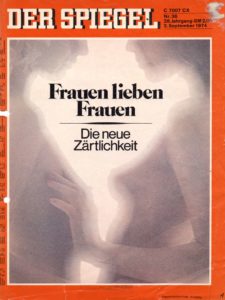
„We were already labeled lesbians before we knew we were,“ said American feminist Robin Morgan in the early 1970s. And indeed, within the women’s movement, not just a minority of previously gay women were involved. Over the course of the women’s shared commitment to the cause, some hitherto hetereosexual women fell in love with the feminists next door. The ‚New Tenderness‘ sometimes became ‚New Bisexuality‘ or ‚New Homosexuality‘.
20th-21th September, 1974
A National Women’s Congress with 13 women’s groups takes place in Bochum. Key topics are § 218, the Ihns / Andersen trial, homosexuality and heterosexuality as well as planned publications such as the Women’s Yearbook on the Status of the Women’s Movement, which the Frankfurt Women’s Center intends to publish.
Autumn 1974
The novel by the East Berlin author Irmtraud Morgner Leben und Abenteuer der Trobadora Beatriz nach Zeugnissen ihrer Spielfrau Laura is published simoultaneously in the FRG and the GDR. The fantastic-realistic „montage novel“ is the first offensive feminist text from the GDR by a writer being also well-known in the West at that time.
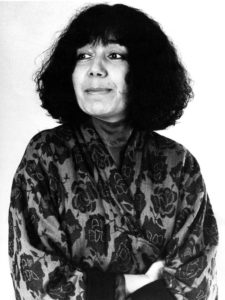
The content: In the medieval France of the troubadours, the souls of a female and a male infant are confused. The boy takes care of it while the girl travels the world on a time journey. The text is in the literary and content of strong attention. Morgner is from now on, next to Christa Wolf, as a showcase feminist of the GDR. As a result, confessing socialist and feminist Irmtraud Morgner will repeatedly come into conflict with the Stasi and censorship. In 1990, Morgner dies of cancer. Her last interview is in EMMA, shortly before the German reunion.
October 1, 1974
The verdict is read in the murder trial of Marion Ihns and Judy Andersen. Both women are sentenced to life in prison for employing a contract killer to murder Marion Ihns’s husband. The background story of the women – both being raped in childhood, Marion Ihns being abused by her husband – are not taken into account in the judgment.
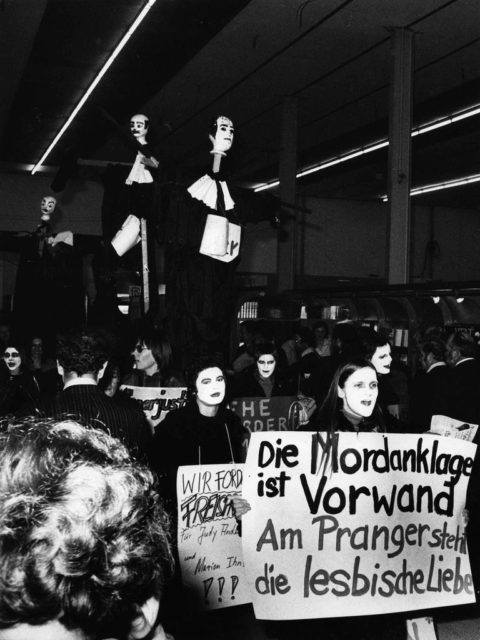
Afterwards, women’s groups from across Germany demonstrate in front of the court house in Itzehoe. Motto: “The murder charge is just an excuse – lesbian love is in the pillory!” See Leaflet + Spiegel article
In an article for konkret Alice Schwarzer writes: „For weeks a male-dominated press celebrates how to turn a murder trial into a process against lesbians.“
Not only the women’s groups protest against the lurid and defamatory reporting, but also – so far unique in German media history – 136 journalists and 36 journalists at the German Press Council. He makes a complaint.
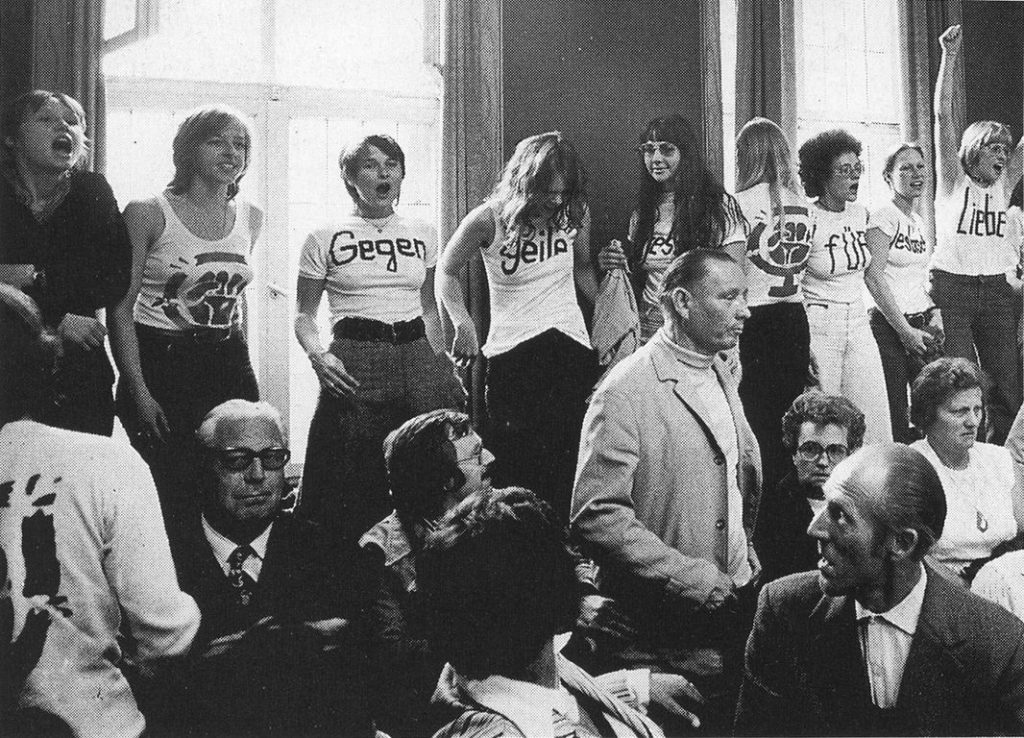
15th-17th November 1974
The International Women’s Congress, which was planned by the women’s conference in Cambridge, takes place in Frankfurt. Around 600 women from 18 countries take part. The occasion is that the UN proclaimed the year 1975 Year of Women, with which the United Nations respond to the international women’s movement. The congress participants plan numerous feminist activities for the ‚Year of the Woman‘ from the ‚Beischlaf-Streik‘ [Coitus Refusal] to the ‚Tribunal against the Crimes against Women‘.
Only one representative of the autonomous women’s movement, Helke Sander, has been appointed to the German board of trustees for the „Year of the Woman“. In her inaugural address, she attacks other members of the board of trustees, such as the employer’s president Hanns Martin Schleyer or the Catholic bishop Tenhumberg.
![Bookhagen, Renate; Schlaeger, Hilke; Scheu, Ursula; Schwarzer, Alice; Zurmühl, Sabine [Hrsg.]: Frauenkalender 1975, (FMT-Signatur: NA.09.013-1975) Bookhagen, Renate; Schlaeger, Hilke; Scheu, Ursula; Schwarzer, Alice; Zurmühl, Sabine [Hrsg.]: Frauenkalender 1975, (FMT-Signatur: NA.09.013-1975)](http://frauenmediaturm.de/wp-content/uploads/2018/04/74_D21_Frauenka-221x300.jpg)
December
The first women’s calendar appears. The editors are Ursula Scheu, Alice Schwarzer, Hilke Schlaeger, Sabine Zurmühl and Renate Bookhagen. The publishers rediscover texts of the First Women’s Movement during their research. „We have learned – and this was probably the most surprising experience – the extent of the tradition of German women in the struggle for liberation. 100 years ago, they were already somewhat more advanced, more self-confident, clear-sighted and determined than we are today. That encouraged us.“ The Frauenkalender, a kind of feminist chronicle of current and historical events, will be published continuously until 2000.



